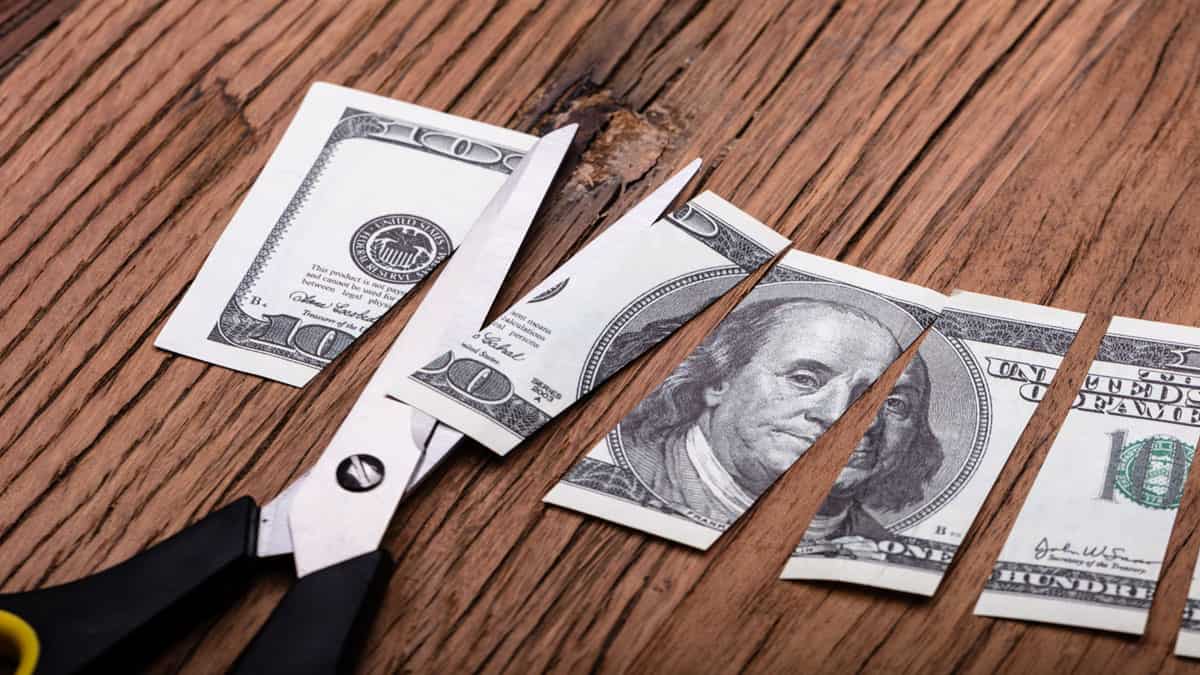THIS POST MAY CONTAIN AFFILIATE LINKS. PLEASE SEE MY DISCLOSURES. FOR MORE INFORMATION.
Are you struggling to get ahead financially?
The truth is, you might be doing some basic things that are ruining your chances to build wealth.
What are these common ways that people are unknowingly ruining their finances?
In this article, we’ll explore different ways you damage your finances without realizing it and how to avoid these pitfalls.
Get ready for an eye-opening look into just how much a few bad decisions can affect your wallet!
#1. Keeping All Of Your Money In Your Checking Account

One of the biggest issues with lacking wealth is being lazy.
In this regard, laziness is not taking the 5 minutes to open a savings account to put money into.
The reason for not keeping all your cash in a checking account is that you will want to spend it.
Very few people look at their checking account balance and say, “of this $5,000 balance, $3,000 is savings so I can only spend $1,500.”
Instead, most people will treat the entire amount as being able to be spent.
Take the time to open a savings account and then regularly move money into it to have money for emergencies and other short-term needs.
#2. Not Earning Competitive Interest On Savings

You might think that since you have money in a savings account, you are smart with your money.
While you are smarter than those who keep everything in their checking account, you aren’t much better off if you aren’t earning a competitive interest rate.
Many savings accounts still pay less than 1% interest, even after interest rates and inflation have skyrocketed.
Take a few minutes to see what your savings account is paying. Ideally, you want a rate of 3% or higher. If it isn’t, you need to switch.
The good news is switching is easy, especially when you open an online savings account. For example, it will take less than 10 minutes to open an account at CIT Bank, and once you set it up, you can automate the entire process moving forward.
#3. Not Investing Your Money

Investing in the stock market can be scary, but you need to overcome that fear.
Earning low interest rates in savings accounts is great for emergencies and short-term savings, but you are losing out if you do not invest that money for long-term savings.
Sure, you don’t risk losing your money in the bank, but as the cost of living increases, the interest you are earning is barely keeping up with inflation.
This means when you go to retire, you will have a difficult time making ends meet.
The good news is investing is simple when you follow the right advice.
#4. Not Tracking Your Spending

Budgeting isn’t glamorous, but you need to know where your money is going if you ever want to get ahead financially.
The good news is there are plenty of options to make budgeting your money easier.
One of the best options is Tiller Money. This is a spreadsheet budget that is automated. This means it automatically pulls in your transactions, so all you have to do is spend 5 minutes every few days making sure the spending categories are correct.
Make sure you start tracking how you spend money. Doing so will help you understand where you might be wasting money and can cut back to save.
#5. Ignoring Subscriptions You’re Paying

In today’s world, every company wants to get you signed up for a monthly subscription. Even Amazon is pushing its “subscribe and save” program more and more.
While the monthly cost is low for many services, the downside is it is easy to forget what you are paying for.
Fast forward a year or more; you could be paying for things you no longer use, wasting money.
Because of this, you need to review your subscriptions every few months. Depending on how you pay them, this could be easy or complex.
Again, thanks to technology, there is help.
Rocket Money, for example, will review your subscriptions and alert you to ones it thinks you can cancel. As a bonus, you can also have them negotiate some of your bills.
#6. Not Understanding Time

Time is critical when it comes to long-term financial success. The sooner you start saving for retirement, the better off you will be.
This is because you can save a small amount each month starting in your 20s and end up with over $1 million.
But wait until you are 50, and you need to save hundreds, if not thousands, per month.
Another issue is many people who put off saving see how much they need to save every month for retirement and give up without starting.
Even if you only have 15 years to save, that is better than nothing. While you might not end up with $1 million, you might end up with $400,000.
Would you rather have $400,000 or $500 for retirement?
So if you take anything away from this, at least know you need to start saving right now.
#7. Giving Into Instant Gratification

We live in a world that has conditioned us to want everything at this very minute. And if we don’t get it, we either become upset or give in and put it on a credit card.
You have to learn to delay gratification.
Doing so will help you to avoid purchases you later regret.
So how do you do this effectively? Whenever you see something you want, write it down. Then in 30 days, review your list.
Chances are you won’t want the item in question. If you do, ask yourself why you want it and if there are any alternatives.
Then if you really do want it, spend time looking for coupons or other discounts to help you save money on the purchase.
#8. Keeping High-Interest Debt

We all have debt. While some of us follow the Baby Steps from Dave Ramsey and hope to become debt free one day, not everyone does.
So while some debt is understandable, like your mortgage, you need to make it a point to pay off your high-interest credit card debt as soon as possible.
As you sit on a balance, the amount you owe keeps growing or barely goes down when you make a payment. Over time, this makes a $100 turn into a $500 purchase when considering interest.
Take a few minutes and write down your credit card debt and organize it from smallest balance to largest.
Then pay the minimum on everything except the smallest amount. For this one, pay as much as you can. Once you pay it off, put that amount towards the next smallest balance, along with the minimum you were paying.
Repeat until all your credit card debt is gone.
#9. Giving Into Lifestyle Creep

Lifestyle creep is when our expenses grow as our income goes up. A popular example of this is a new college graduate.
They had no money in college, but now that they have a job, they want new clothes, a new car, and more.
If they can keep living the college lifestyle, they can save a boatload of money and set themselves up nicely for the future.
But it’s not just new grads that experience this. You are most likely guilty of lifestyle creep whenever you get a raise.
You might buy a new car or take an expensive vacation.
In an ideal world, you would keep living on the same income and save your raise.
But we both know that is not likely for most people.
A better solution is to make it a point to save a portion of your raise. If your raise is an extra $200 per paycheck, make it a point to put $100 into savings and use the other $100 for living expenses.
Of course, if you can save more, do so.
#10. Not Investing In Yourself

To get ahead financially, most people think of ways to earn a higher return on their money or even switch jobs to get a higher salary.
But very few think about investing in themselves.
The reality is you are your greatest asset. This means no investment will earn as much of a return as improving your skills.
For example, if your job has you working with Excel spreadsheets all day, take a class to learn macros and other advanced Excel functions.
Then take that knowledge and use it to get a more significant raise.
If your employer doesn’t budge, then look for employment elsewhere.
While you can argue you could find another job without these new skills, you can get a bigger starting salary with them.
Finally, this doesn’t only apply to your career.
If you can learn how to do basic repairs around the house, you can save thousands by not calling in a handyman.
More From Money Smart Guides

With inflation rising, your monthly bills are likely getting out of control. Luckily, there are some simple steps you can take. Use this guide to help you save up to $7,000 a year on your monthly bills.
SLASH YOUR MONTHLY BILLS AND SAVE
How To Become Financially Independent

Being financially independent means not having to worry about money ever again. You can choose to work if you want to, and spend money as you wish. But how do you get there? Here are the steps you need to take.
HOW TO BECOME FINANCIALLY INDEPENDENT
21 Habits Of Wealthy People

Do you what separates the wealthy from everyone else? It’s their habits.
The good news is learning their habits is simple which means with a little effort, you too can become wealthy.
15 Gas Hacks For Free Gas

You’ve probably wished you could get free gasoline, but thought that was impossible. But the reality is, it isn’t impossible.
There are many free gas hacks you can use to save money on fuel ups. Here are 15 ways to lower the cost of gasoline, and in effect, get free gas.
15 FREE GAS HACKS YOU NEED TO TRY
How To Save Money

If you want to get ahead financially, you need to put some money into savings on a regular basis.
Unfortunately, many of us never do. But that changes now. Here are over 100 simple things you can do to start saving money every day
I have over 15 years experience in the financial services industry and 20 years investing in the stock market. I have both my undergrad and graduate degrees in Finance, and am FINRA Series 65 licensed and have a Certificate in Financial Planning.
Visit my About Me page to learn more about me and why I am your trusted personal finance expert.

